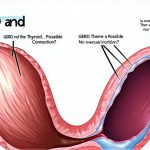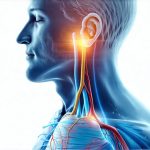Gastroesophageal reflux disease (GERD) and irritable bowel syndrome (IBS) are two remarkably common digestive disorders, frequently causing discomfort for millions worldwide. While often treated as separate entities, there’s a growing understanding of the significant overlap between them – both in terms of shared underlying mechanisms and co-occurrence. Many individuals experience symptoms of both conditions simultaneously, leading to complex diagnostic challenges and treatment strategies. Recognizing this interconnectedness is crucial not only for accurate diagnosis but also for developing more effective, holistic approaches to manage these often debilitating conditions.
The frequent coexistence of GERD and IBS isn’t merely coincidental. Research suggests a strong bidirectional relationship: having one condition increases the likelihood of developing the other. This overlap hints at shared physiological pathways involving gut motility, visceral hypersensitivity (an increased perception of pain from internal organs), inflammation, and even the microbiome – the complex community of bacteria residing in our digestive tract. Ignoring this connection can result in fragmented care, addressing symptoms in isolation without tackling the root causes that may be driving both conditions. Ultimately, understanding how GERD and IBS interact allows for a more comprehensive and patient-centered approach to digestive health.
The Intertwined Physiology: How GERD & IBS Connect
The link between GERD and IBS isn’t easily explained by simple geography; it’s about the intricate communication network within our gut. GERD, characterized by acid reflux, impacts the esophagus but can have ripple effects further down the digestive tract, influencing bowel function. Conversely, disturbances in bowel motility characteristic of IBS can affect esophageal pressure and contribute to reflux symptoms. This creates a feedback loop where one condition exacerbates the other. For example, chronic inflammation from GERD may heighten visceral hypersensitivity, making individuals more sensitive to abdominal discomfort associated with IBS.
One key aspect is the role of the migrating motor complex (MMC). The MMC is a wave-like contraction that sweeps through the digestive tract during fasting, clearing out undigested food and bacteria. In both GERD and IBS, this process can be disrupted. Frequent acid reflux in GERD can impair MMC function, leading to bacterial overgrowth in the small intestine (SIBO), which is frequently observed in IBS patients. Similarly, altered motility patterns in IBS can affect the lower esophageal sphincter (LES) – the muscle that prevents stomach acid from flowing back into the esophagus – increasing the risk of reflux.
Furthermore, alterations in the gut microbiome are increasingly recognized as a central player. Dysbiosis, an imbalance in gut bacteria, is common in both conditions and can contribute to inflammation, increased intestinal permeability (“leaky gut”), and altered nerve function. This creates a vicious cycle that perpetuates symptoms for both GERD and IBS sufferers. Addressing the microbiome through dietary changes or probiotic supplementation may be a crucial component of managing these overlapping disorders. It’s important to consider how balancing digestive fluids can contribute to overall gut health.
Understanding Visceral Hypersensitivity
Visceral hypersensitivity is often described as having a lower threshold for pain in the gut. What might feel like mild discomfort to one person can be excruciatingly painful to another with heightened visceral sensitivity. This isn’t simply “being dramatic”; it’s a genuine neurological phenomenon where nerves become overly sensitive and amplify signals from the digestive tract. In both GERD and IBS, visceral hypersensitivity plays a significant role in symptom perception and severity.
The connection lies in how the brain interprets these gut signals. Chronic inflammation associated with GERD or IBS can lead to changes in the central nervous system, effectively “rewiring” the way pain is processed. This means that even normal digestive processes might be interpreted as painful stimuli. Moreover, psychological factors such as stress and anxiety can further amplify visceral hypersensitivity. This explains why stressful events often exacerbate symptoms of both GERD and IBS. Understanding why IBS and gas flare up with stress is key to managing it.
Managing visceral hypersensitivity involves a multi-faceted approach. It’s not just about reducing inflammation; it’s also about retraining the brain to reinterpret gut signals. Strategies include:
1. Low FODMAP diet (for IBS): Reducing fermentable carbohydrates can lessen gas production and distension, decreasing gut stimulation.
2. Stress management techniques: Mindfulness, meditation, or cognitive behavioral therapy (CBT) can help regulate nervous system activity.
3. Neuromodulation therapies: In some cases, specific medications targeting nerve pathways may be beneficial under a doctor’s guidance.
The Role of Dietary Triggers & Food Sensitivities
Dietary choices are paramount in managing both GERD and IBS, but the specifics can differ significantly. For GERD, common triggers include fatty foods, chocolate, caffeine, alcohol, and spicy foods – all of which can relax the LES or increase acid production. However, for individuals with co-occurring conditions, navigating dietary restrictions can be complex. What alleviates GERD symptoms might worsen IBS symptoms, and vice versa.
IBS often involves sensitivities to specific food groups, most notably FODMAPs (fermentable oligosaccharides, disaccharides, monosaccharides, and polyols). These carbohydrates are poorly absorbed in the small intestine, leading to fermentation by gut bacteria and subsequent gas production, bloating, and abdominal pain. A low-FODMAP diet can be highly effective for many IBS sufferers, but it requires careful planning and potentially restricts foods that might otherwise be tolerated by someone with GERD.
Identifying individual food sensitivities is key. An elimination diet, conducted under the guidance of a registered dietitian or healthcare professional, can help pinpoint trigger foods. This involves removing suspected problematic foods from the diet for a period and then systematically reintroducing them to observe any adverse reactions. It’s important to remember that dietary restrictions should be personalized and based on individual tolerance levels. A one-size-fits-all approach is rarely effective. It may also be necessary to consider avoiding soy if sensitivities exist.
Lifestyle Modifications & Holistic Management
Beyond medication and dietary changes, lifestyle modifications are essential for managing the overlap between GERD and IBS. These aren’t quick fixes but rather long-term strategies to support overall digestive health and reduce symptom severity. Regular exercise, stress management techniques, adequate sleep, and maintaining a healthy weight all contribute to improved gut function and reduced inflammation.
Smoking cessation is also critical. Smoking weakens the LES, increasing reflux episodes in GERD, and can exacerbate IBS symptoms. Similarly, managing stress levels through mindfulness, yoga, or CBT can have a profound impact on both conditions. Chronic stress disrupts gut motility, increases visceral hypersensitivity, and negatively impacts the microbiome.
Ultimately, effective management of overlapping GERD and IBS requires a holistic approach that addresses all contributing factors. This involves collaboration between patients and healthcare professionals – including gastroenterologists, dietitians, therapists, and potentially other specialists – to develop personalized treatment plans tailored to individual needs and circumstances. The focus should shift from simply suppressing symptoms to understanding the underlying mechanisms driving these conditions and promoting long-term digestive well-being. It’s also helpful to consider balancing structure and flexibility in routines for consistent health. Furthermore, recognizing the link between seafood and discomfort can help individuals make informed dietary choices. Finally, finding the line between picky eating and genuine discomfort is important for nuanced dietary approaches.


















